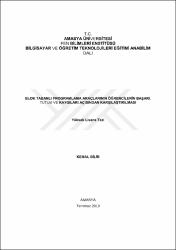| dc.contributor.advisor | Öner, Feda | |
| dc.contributor.author | Bilir, Kemal | |
| dc.date.accessioned | 2022-03-09T14:55:52Z | |
| dc.date.available | 2022-03-09T14:55:52Z | |
| dc.date.issued | 2019 | |
| dc.identifier.uri | https://tez.yok.gov.tr/UlusalTezMerkezi/TezGoster?key=_F5QEpayDXGqGZlp9XiFtOVanK9LD5GC06Tmvhunn4ExtWtue1TKqryvI3nmmbGH | |
| dc.identifier.uri | https://hdl.handle.net/20.500.12450/1704 | |
| dc.description.abstract | Son yıllarda hemen hemen herkesin programlama öğrenmesi gerektiği dile getirilmektedir. Bunun nedeni 21.yüzyılda geliştirilmek istenen problem çözme ve yaratıcılık gibi becerilerin programlama ile geliştirilebileceği düşüncesidir. Özellikle programlama yapmanın geleneksel zorluk algısından kurtarılması yönüyle Blok Tabanlı Programlama (BTP) daha fazla işlevsel hale gelmektedir. BTP ise kendi içerisinde farklı öğretim yöntemleri ile sunulmakta ve bireylerin daha fazla seçeneğe sahip olmalarını sağlamaktadır. Bu çalışmada farklı yapılardaki BTP araçlarının öğrencilerin programlama başarılarına, programlamaya karşı tutumlarına ve programlamaya karşı kaygılarına etikleri incelenmiştir. Bu amaç doğrultusunda çalışma 2017-2018 eğitim öğretim yılı güz döneminde Amasya Üniversitesi Bilgisayar ve Öğretim Teknolojileri Bölümünde Programlama-I dersi alan 43 2.sınıf öğrencisi ile yürütülmüştür. Kontrol grubunda 10 kadın, 11 erkek öğrenci deney grubunda 10 kadın, 12 erkek öğrenci yer almıştır. Çalışmada nicel araştırma yöntemlerinden kontrol gruplu ön test-son test yarı deneysel desen kullanılmıştır. Katılımcılara uygulamadan önce algoritma başarı ön testi, programlamaya karşı tutum ön testi ve programlamaya karşı kaygı ön testi uygulanmıştır. Kontrol grubuna Scratch BTP aracı ile deney grubuna ise HackerCan BTP aracı ile dört haftalık programlama eğitimi verilmiştir. Eğitim sonunda her iki gruba da algoritma başarı son testi, programlamaya karşı tutum son testi ve programlamaya karşı kaygı son testi uygulanmıştır. Analiz sonuçlarına göre ön test algoritma başarıları benzer çıkan grupların son test başarılarında kontrol grubunun puanları yüksek olmasına rağmen aralarında anlamlı bir fark ortaya çıkmamıştır. Programlamaya karşı kaygı ve programlamaya karşı tutum ön testleri de benzer sonuçlar vermiştir. Eğitim sonunda öğrencilerin kaygılarında da azalma olduğu ortaya çıkmıştır. Ancak deney grubunun programlamaya karşı kaygısında anlamlı bir azalma olmasına rağmen kontrol grubundaki kaygı azalması anlamlı değildir. Programlamaya karşı tutum son test sonuçlarına bakıldığında ise öğrencilerin tutumlarının programlama eğitimi aldıktan sonra olumlu yönde değiştiği gözlemlenmiş ancak kontrol ve deney grupları arasında anlamlı bir farkın olmadığı gözlemlenmiştir. Bu sonuçlar BTP eğitiminde her iki yönteme dayalı olarak düzenlenen araçların öğrenci başarısını arttırdığını, öğrencilerin tutumlarını olumlu yönde etkilediğini ve öğrencilerin kaygılarını azalttığını göstermiştir. | en_US |
| dc.description.abstract | In recent years, it is highlighted that almost everyone should learn programming. The main reason for this is the idea that the skills such as problem solving and creativity, desired to be developed in the 21st century, can be developed by programming. Block Based Programming (BBP) is becoming much more functional, especially in terms of eliminating the traditional perceptions about the difficulty of programming. Furthermore, BBP is offered through different teaching methods and enables individuals to have more options. In this study, the effects of a variety of BBP tools on students' success in programming, their attitudes towards programming and their concerns about programming were examined. For this purpose, the study was carried out with 43 students, studying at the Department of Computer Education and Instructional Technology at Amasya University, in the fall semester of 2017-2018 academic year. They were in their second year of the study and taking Programming-I course. The control group consisted of 10 female and 11 male students. The experimental group consisted of 10 female and 12 male students. In the study, employing quantitative research method, pretest-posttest quasi-experimental design with control group was used. The pre-tests on Algorithm achievement, attitudes towards programming and anxiety against programming were applied to the participants before the implementation. The control group got training by means of Scratch BBP tool and the experimental group received training with the HackerCan BBP tool for four weeks. At the end of the training, the post-tests on algorithm achievement, attitude towards programming and anxiety towards programming were carried out with both groups. According to the analysis results, there was no significant difference between the algorithm achievement post-test scores of the control group and the experimental group, although the control group had higher scores than the experimental group. At the end of the training, it was found out that there was a decrease in students' level of anxiety. However, although there was a significant decrease in the level of anxiety of the experimental group against programming, the decrease in the level of anxiety of the control group was not significant. When the analysis results of attitudes towards programming post-test were examined, it was found out that the students' attitudes changed positively after receiving the programming education, but there was no significant difference between the control and experimental groups in this respect. These results shed a light on the fact that tools designed on the basis of both methods in BBP education increased students' achievement, positively affected students' attitudes and reduced students' level of anxiety. | en_US |
| dc.language.iso | tur | en_US |
| dc.publisher | Amasya Üniversitesi | en_US |
| dc.rights | info:eu-repo/semantics/openAccess | en_US |
| dc.subject | Bilim ve Teknoloji | en_US |
| dc.subject | Science and Technology | en_US |
| dc.subject | Eğitim ve Öğretim | en_US |
| dc.subject | Education and Training | en_US |
| dc.subject | Bilgisayar programlama | en_US |
| dc.subject | Computer programming | en_US |
| dc.subject | Bilgisayar ve öğretim teknolojileri eğitimi bölümü | en_US |
| dc.subject | Department of computer education and instructional technology Onaylandı | en_US |
| dc.title | Blok Tabanlı Programlama Araçlarının Öğrencilerin Başarı, Tutum ve Kaygıları Açısından Karşılaştırılması | en_US |
| dc.title.alternative | Comparison of Block Based Programming Tools in Terms of Students' Achievements, Attitides, and Level of Anxiety | en_US |
| dc.type | masterThesis | en_US |
| dc.department | Enstitüler, Fen Bilimleri Enstitüsü, Bilgisayar ve Öğretim Teknolojileri Eğitimi Ana Bilim Dalı | en_US |
| dc.identifier.startpage | 1 | en_US |
| dc.identifier.endpage | 74 | en_US |
| dc.identifier.yoktezid | 632404 | en_US |
| dc.institutionauthor | Bilir, Kemal | |


















